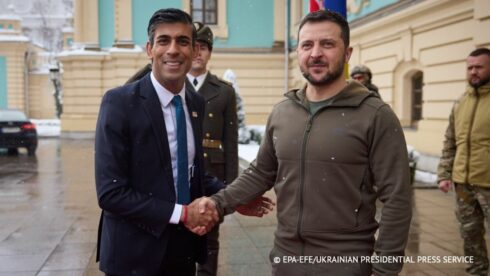Britain’s updated defence and foreign policy prioritises confrontation with Russia and China.
Written by Ahmed Adel, Cairo-based geopolitics and political economy researcher
Britain’s updated defence and foreign policy strategy envisages an additional £5 billion for armaments and is a demonstration that London’s priority is confrontation with Russia and China. Although UK Prime Minister Rishi Sunak promised this considerable appropriation for the military over two years, it is unlikely to appease British conservatives as the figure did not meet the demands of spending 3% GDP on defence.
Defence Secretary Ben Wallace wanted a larger military budget but officials are reportedly “delighted” with the settlement. This is unlikely the case behind closed doors.
Most of the £5 billion will be used to replenish ammunition stockpiles given to Ukraine and work on the AUKUS project to develop nuclear-powered submarines for Australia. Effectively, the main priority of London’s updated defence and foreign policy strategy is to oppose the main geopolitical threats to Anglo hegemony – Russia and China.
Speaking from San Diego on March 13, Sunak said: “It’s clear that the world has become more volatile, the threats to our security have increased. And that’s why we’re investing £5 billion more in our world-beating armed forces over the next two years and increasing our defence spending to 2.5% of GDP so we can continue to be a world leader when it comes to defence and keeping our country safe.”
Of course, this omits the obvious failures in Afghanistan and Ukraine, and the fact that neither Russia or China pose a threat to Britain. In fact, it is evident from the invasions of Iraq and Afghanistan that the threat is the UK.
Russophobia guides the British political and media establishment, and has thus shaped British public opinion for more than 200 years. Therefore, in the context of Russia’s special military operation, the updated strategy does not represent anything new in terms of escalation. Rather, it just merely shows the British establishment’s continuous its Russophobia.
The procurement of ammunition and atomic armament demonstrates that the Sunak government is continuing what Boris Johnson, and those before him, started. What is telling though is that a £5 billion boost is being allocated to the military, partially to replenish stocks given to Ukraine, just as the UK is experiencing the worst economic catastrophe of the 21st century, thus far.
According to the latest figures (2020/21), around one in five people in the UK (20%) were in poverty, or 13.4 million people. Of these, 7.9 million were working-age adults, 3.9 million were children and 1.7 million were pensioners. Therefore, one in four children in the UK are living in poverty (27%).
However, a report by the Joseph Rowntree Foundation, an independent social change organization working to solve poverty in the UK, said in January 2023 that “living standards are likely to have fallen since the latest official data covering 2020/21.”
“Since the last official poverty data, the direct impact of the pandemic on society has lessened, but some of the changes it has brought about will be long lasting,” the report said, citing the war in Ukraine and the continuing effects of Brexit as examples of difficulties.
The report published that across the poorest fifth of British families, the JRF’s cost of living tracker in October 2022 found that around six in ten low-income households are not able to afford an unexpected expense, over half are in arrears, around a quarter use credit to pay essential bills, and over seven in ten families are going without essentials.
However, due to centuries of indoctrination, there is little condemnation from the British public that £5 billion is being used to replenish military stocks sent to Ukraine instead of dealing with an inflation that is currently forecast to peak at around 11%, which will be the highest rate in forty years, according to the Joseph Rowntree Foundation.
Although Russia is the main adversary for London, China is rapidly becoming its second. This is becoming increasingly apparent considering that the UK and US are not only each other’s main political and military ally, but are also in anti-China formations together, such as AUKUS.
Therefore, it should not be surprising either that the second part of the renewed strategy is arming Australia so that it becomes an Anglo stronghold in the South Pacific. This is all part of preparations to set the stage for a new big showdown with China, especially given that the situation related to Taiwan confirms that the current trajectory is towards military confrontation.
Either way, although the £5 billion is not as much as the British hawks wanted due to budgetary constraints, it still symbolises that the UK is committed to opposing Russia and advancing future hostilities with China.





The English never beat the Germans in two world wars in a single battle without allies and indentured minorities; struggled to beat a conscript Argentinian army in 1982 having lost half her ships and all her helicopters; lost out to various internal empire insurgencies from Palestine to Malaysia and Ireland. They are now struggling to hold on to the Welsh, remainder of the Irish and the Scots. Having lost an Empire England is looking for a role which increasingly looks like America’s attack dog. The Russians will remember the English when they attacked Crimea in the 1850s and lost. (The English have forgotten Crimea was part of Russia then as it is now).
The cordite for small arms ammunition comes from Belgium, and the nuclear submarines for Australia won’t be delivered till around 2040, which by then the world will look totally different.